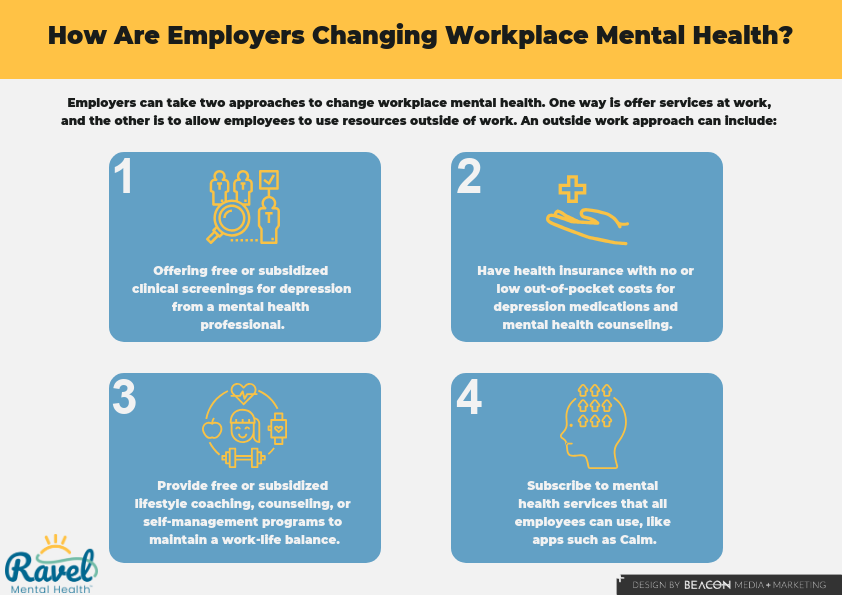More people are recognizing the importance of prioritizing mental health and encouraging others to do the same. While in the past is has been difficult for people to talk about their mental health and how it’s affects their daily lives, people are becoming more open to talking about their struggles and the importance of self-care. From social media posts to online videos, you can find endless examples of people advocating for a shift in how we address mental health issues.
People are recognizing that good mental health goes beyond the therapist’s office. Just like physical health, our daily habits, thinking patterns, and environments all play a role in how emotionally healthy a person is. And sometimes that means setting boundaries, carving time for personal development, and eliminating things that are unhealthy.
When it comes to prioritizing mental health, one area that has received much of the spotlight is the workplace. A stressful work environment can negatively impact heir employees’ mental health, and employers are becoming more aware of how poor mental health can affect their employees’ work, including a decrease in work quality and efficiency. Additionally, many employers are simply concerned about their employees and want to promote a healthy, productive work culture.
So, how does that affect mental health professionals? With an emphasis on keeping employees safe and happy, it can help reduce the stress on your patients and may even help close the gap between mental health services and the demand. Here are how employers are striving to improve workplace mental health and how it will affect the mental health industry.
Are you interested in connecting with more clients? Sign up for Ravel Mental Health today to get started!
Why Are Employers Prioritizing Workplace Mental Health?
The pandemic has shifted the perspective of what the workplace looks like. It now includes the physical workplace and the home office. The definition of workplace is now more about the community rather than the physical office.
With so many employees working from home, the line between a work-life balance has become unclear. Some employees have a hard time separating their work from life at home and may end up working longer hours.
It is clear to employers that their employees’ mental health levels play an important role in the quality of their work. So, they’ve begun to prioritize a happier workplace to lower the stress on their employees and still push for success.
Poor mental health and stress can lead to negatively affecting employees with their:
- Job performance and productivity.
- Engagement with one’s work.
- Communication with coworkers.
- Physical capability and daily functioning.
The Mental Health America’s (MHA) Mind the Workplace 2021 Report has provided an understanding of the mental health challenges that employees have faced during the pandemic.
Their survey found that nine in ten employees say that workplace stress directly affects their mental health. About 65% of employees found it difficult to concentrate in the workplace due to their environment compared to 46% in 2018. Part of this can be attributed to working at home, but only 5% of employees reported that their employers provided a safe environment for people who live with mental illness.
Without a safe environment, it can be challenging for employees to complete their work. It can also be difficult for some as 60% of employees aren’t paid enough to save for an emergency. This excess stress can make it difficult to complete quality work.

How Are Employers Changing Workplace Mental Health?
There are several ways that businesses can work towards improving the mental health of their employees. Some take an approach for just at-work help, while others also offer outside resources.
The At-Work Approach
An at-work approach can include what employers do for their employees during the workday. This can consist of breaks, four-day work weeks, team-building exercises, monthly conversations with higherups, and reinforcing good work.
Some at work exercises that employers can take are:
- Mental health assessment tools available to all employees
- Distribute materials with information about the signs and symptoms of poor mental health and opportunities for treatment
- Host seminars and workshops that address depression and stress management to reduce anxiety and improve motivation
- Create and maintain dedicated quiet spaces for relaxation activities
- Provide managers with training on how to recognize and help employees with stress and depression
- Give employees opportunities to participate in decisions about issues that affect their job stress
Outside Work Approach
Another resource for employers is offering mental health services outside of the workplace. This can include:
- Offering free or subsidized clinical screenings for depression from a mental health professional.
- Have health insurance with no or low out-of-pocket costs for depression medications and mental health counseling.
- Provide free or subsidized lifestyle coaching, counseling, or self-management programs to maintain a work-life balance.
- Subscribe to mental health services that all employees can use, like apps such as Calm.
Do you want to help people with their work-life balance? Sign up for Ravel Mental Health today to connect with new clients!
How Does Workplace Mental Health Affect People?
Stress from work can be the main factor in why someone may be facing a mental illness. As most people spend about a third of their life at work, it is a significant portion of someone’s daily life. If they’re unhappy at work, it can be incredibly difficult to separate those feelings when they return home.
Being happier and feeling like you’re adequately appreciated and paid can significantly affect someone’s overall mental health. This can ensure that they won’t be tempted to leave their job or experience burnout. People with stressful jobs tend to have higher rates of burnout and are unhappy in the workplace.
Being happier at work can also affect their work-life balance. Some may feel better about working longer hours because they feel as if their work is meaningful and appreciated. Others may create a work-life balance that allows them to accomplish high goals in the workplace and chase after life goals.
In some of your clients who have a healthy work-life balance, you may see that they are more willing to try new experiences and are motivated to achieve life goals. This can help reduce more severe symptoms of underlying mental health issues and allow them to focus on growing themselves.
How Can Therapists Help With Workplace Mental Health?
There are a few ways to help with good workplace mental health. One way to help is by offering services for specific businesses and their employees. You can help by holding informational seminars or training management on how to spot signs of unhappiness in the workplace.
Then for your clients, you can help by offering ways for them to find a good work-life balance. This can include:
- Having them talk to their management about stressful work issues or too heavy of a workload.
- Creating a specific space for work if they’re working from home to help separate the two.
- Work towards feeling good by taking time off work instead of possibly feeling guilty
- Planning ahead to combine work activities with leisure, social, or fitness activities.
- Starting and ending work at a particular time of their day can help them understand when it’s time to stop working.
These tips can help someone maintain balanced mental health between work and home. You can also help others by reaching more people.
With Ravel Mental Health, you can reach new clients in a matter of clicks. It can sometimes be challenging for people to know what mental health services there are in their area. By signing up, they can access your availability calendar and easily book an appointment with you.
Ravel Mental Health is dedicated to closing the demand for mental health services and finding care. You’ll be able to meet new clients and help more people.
Using our online platform, you can also achieve a better work-life balance by blocking out your available time. Whether you’re in a clinic or at home, clients can reach you easily.
Are you ready to take the next step towards a better work-life balance? Sign up for Ravel Mental Health today to get started!
